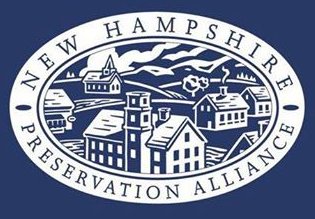Andrew Cushing Joins Staff of N.H. Preservation Alliance
Preservation Expert to Provide Services to Community Leaders and Projects
The N.H. Preservation Alliance is pleased to announce that Andrew Cushing of Grafton, New Hampshire has joined its staff this month. As our Community Preservation Services Manager, he will provide services to community leaders and property owners who are working to save, re-use or revitalize historic properties and utilize planning and preservation tools to encourage stewardship and investment. “We are so pleased to have Andrew and his deep knowledge of Granite State and creative preservation strategies on our team,” said Jennifer Goodman, Executive Director, N.H. Preservation Alliance. “We’re tackling new issues while continuing to help people across the state with our popular services.” (Scroll down for a Q&A with Andrew!)
Cushing will draw experience from prior positions with N.H. Bureau of Historic Sites where he oversaw a portfolio of two dozen properties in the State Park system and an impressive three-year stint with the Preservation Alliance from 2017-2020. He has also worked for the Preservation Company, the Land and Community Heritage Investment Program, Maine Preservation, and Preservation Timber Framing.
He holds a BA in Environmental Studies and History from Bowdoin College and a MS in Historic Preservation from the University of Pennsylvania.
He is the president of the all-volunteer Mascoma Valley Preservation, a regional nonprofit dedicated to saving and re-purposing historic buildings in the towns of Canaan, Dorchester, Enfield, Grafton, and Orange, New Hampshire. The group owns three properties and has raised over one million dollars for projects in its first three years of operation. He also serves as trustee for the Grafton Public Library and is a budget committee member for the Mascoma Valley Regional School District.
Cushing has been restoring two old houses in East Grafton for the past eight years, tackling everything from window restoration and plaster repair to damp cellars and raccoon infestations.
“Coming back to the Preservation Alliance feels like Old Home Day. I’m excited to re-join the passionate and talented team here and get to work helping communities save more old places.”
Q&A with Andrew Cushing
What makes historic preservation work in the Granite State? Share a couple snapshots of success with readers.
I think our greatest success stories come when collaborations and creative thinking breathe new life into vacant old spaces. If we want people to experience old buildings and become champions for preservation, we need to get them inside. Good examples for me include the Gale School in Belmont, the Parker J. Noyes Block in Lancaster, Post and Beam Brewing in Peterborough, and the Washington Meetinghouse. Truthfully, there are so many more; if my wallet were filled with pictures of my favorite projects, I couldn't fit that wallet in my back pocket.
I grew up in a small and frugal town, which informs my approach to preservation. Everyone knew someone with an excavator or scaffolding or air compressor - even if no one knew anyone with money. Many towns and cities in our state are like that and I've witnessed great projects happen because of a scrappy group using the "neighbor network". Sometimes those groups just need a cheerleader or capital to accelerate or jumpstart the work.
What are the pressing concerns or new issues to tackle?
The pandemic really did amplify worrying trends we're seeing with social organizations, attendance at houses of worship, and the difficulty recruiting and retaining people in our trades. Housing in New Hampshire is also incredibly tight and increasingly unaffordable and weather-related challenges that affect the health of old buildings and communities are rising.
What makes you optimistic about growing preservation investment in the years ahead?
I'm hopeful that the need for housing will force us to re-evaluate our communities' planning priorities and expand preservationists' minds about what is possible with old buildings. I'm optimistic we will shift how we value our tradespeople. My high school was ridiculed for producing so many students who entered the workforce versus top-tier colleges. Now, these are the classmates I rely on for roofing and electrical work and plumbing. They are invaluable to the preservation profession.
Desperation can lead to innovation. It's not always a pretty transition but I suspect we'll come out stronger when the dust settles.
What’s the biggest lesson about preservation you’ve learned while working on your own old house?
Besides the cost overruns and the constant changes of scope? Two things come to mind. First, the importance of reversibility. With the exception of the three inches of kitchen flooring I removed this summer, I’m thankful most things in my house were additive, rather than subtractive. Second, NHPA board members Sue Booth and Michael Duffy told me to just live with my house a bit before committing to changes. I’ve tackled projects with a much different lens with that mindset.
How can NH citizens/readers of this piece make a difference?
I've done a few preservation projects now with an all-volunteer team and I understand how difficult the process can be. Managing construction, raising funds, dealing with dubious stakeholders, navigating the grants world - it's a lot. Not everyone can donate money or time, but I've been equally thankful for people who show up to town meeting to express support, or neighbors who counter negativity online with positive comments, or the angels who provide a six pack after a long volunteer workday. There are people behind these preservation projects and sometimes they just need a pat on the back.

